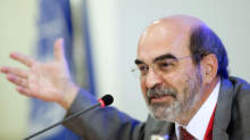Globe and Mail | Monday, June 27, 2011
ERIC REGULY
ROME— Globe and Mail Blog
In his first press conference, the United Nations’s new top food official had strong views on food prices and wishy-washy views on land grabs and biofuels. In an organization where strong views of any kind are rare, it was, over all, an encouraging debut for Brazil’s Jose Graziano da Silva.
On Sunday, Mr. Graziano was elected director-general of the Food and Agriculture Organization by the FAO’s 180 member countries, narrowly beating Miguel Angel Moratinos Duyaube, the former Spanish foreign minister. Mr. Graziano is to replace Jacques Diouf of Senegal, who ruled the FAO for 18 years in spite of waning support from some of the richest donor countries, including Canada. Mr. Graziano officially starts in January.
Mr. Graziano, 61, brings some street cred with him. In the early part of the last decade, he was in charge of Brazil’s “Zero Hunger” program, which was launched by former Brazilian president Luiz Inacio Lula da Silva. It is credited with reducing hunger by about half over six years while lifting 24 million people out of extreme poverty.
Speaking to reporters in Rome, where the FAO is based, Mr. Graziano was asked about his views on everything from FAO reform to the organization’s north-south division (the wealthy northern countries generally threw their support behind his Spanish competitor, not him).
Food prices will remain high and volatile, he predicted, which is not good news for the nearly one billion malnourished people of the planet. The FAO’s food-price index reached an all-time high in February, about three years after the previous high triggered food riots in dozens of countries. The FAO’s food economists blame extreme weather, such as droughts and floods in important food producing areas, as much as high demand and the shift to protein-rich diets. The price index has declined a little since then, but not to the point where the UN food agencies (there are three in Rome) are able to relax.
Mr. Graziano said that “volatility is even worse than high prices.” Indeed, price volatility is one of the biggest worries among farmers in developing countries. Not knowing what prices they will receive for their crops means they are often fearful of investing in agriculture, in spite of the generally high prices.
Who is to blame for the price swings? Unlike most other senior UN food officials, he was willing to put part of the blame on the financial markets, which “had contaminated commodity markets.” While there is huge debate about whether financial speculators are behind the sharp ups and downs in food commodity prices, there is no doubt that “financialization of commodities,” to borrow an economists term, is underway. According to the U.S. Commodities Futures Trading Commission, the value of commodity index-related instruments (from oil to soybeans) purchased by institutional investors in 2003 was $15-billion (U.S.). In 2008, it was $200-billion.
Mr. Graziano had a blander response to biofuels question. Biofuels are chewing up more and more farmland around the world, competing with food crops. More than one-quarter of the American corn crop is now devoted to the production of ethanol, which is blended with gasoline. Paraphrasing the former Brazilian prime minister, he would only say that “there are good biofuels and bad biofuels, just like there is good cholesterol and bad cholesterol.”
He argued, for instance, that Brazil’s sugarcane ethanol neither competes with food production nor demands the destruction of rainforest to make way for sugarcane farms. Other biofuels, however, clearly compete with food producton.
He had a similar response to the “land grabs,” which has seen food importing countries, such as Saudi Arabia, buy vast tracts of farmland in Africa. The farms’ production is removed from the local market and exported to the host country. Mr. Graziano said the land-grab pace was not significant, but that the situation needs to be monitored because “every serpent starts off small.” The UN had written guidelines for the development of the “offshore” farms.
He was more forceful on another contentious area -- genetically modified organisms, or GMOs. He is in favour of them, as a way of boosting farm productivity as food demand soars. What he is not in favour of is GMO seed monopolies, which could make high-tech seeds unaffordable to many farmers. Whether he is willing to take on the Big Agriculture companies, such as Monsanto and Syngenta, for their expanding influence on the seeds market is another question.













